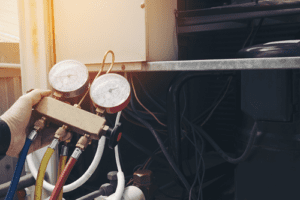When it comes to assessing the cost of a commercial air conditioning system, air conditioner efficiency matters as much as upfront cost. While businesses tend to focus on the price of the AC unit and the cost of installation, it’s better to think of a commercial air conditioner as a long-term investment. A more efficient system will not only cost less to run—thereby saving your business money on monthly utility bills—but will also have a longer lifespan. So, while a highly efficient air conditioning unit might cost more upfront than a less efficient alternative, it will probably end up costing less—and delivering a higher ROI—over time.
For all these reasons, finding ways to maximize the efficiency of your air conditioning unit is a necessity. Both in the purchase stage and post-installation, there are things you can do to ensure the most efficient commercial AC system possible. Read on to learn more.
Pre-Purchase: How to Factor Energy Efficiency into Your Unit Choice
 If you are in the market for a new AC unit, keep these two key factors in mind to guarantee maximum system efficiency:
If you are in the market for a new AC unit, keep these two key factors in mind to guarantee maximum system efficiency:
- Unit size: Work with an HVAC contractor to determine the right size of air conditioner for your building. Every building—depending on its size, layout, ceiling height, and several other factors—will require a different cooling load, measured in British Thermal Units (BTUs). Matching your air conditioner to this required cooling load will ensure the most optimal performance. Having a unit that is either too big or too small for your building will lead to numerous performance, efficiency, and lifespan problems.
- SEER and EER ratings: SEER (seasonal energy efficiency ratio) and EER (energy efficiency ratio) are the ratings that measure the efficiency of air conditioning units. EER measures the efficiency of a unit on any given hot day, while SEER averages out those efficiency/performance ratings for an entire season. Higher SEER and EER ratings on your air conditioning units are preferable, as they indicate greater efficiency.
Focusing on these two elements when choosing a new air conditioning unit for your commercial building will help pave the way toward greater energy efficiency (and lower operational or maintenance costs in the future).
Post-Installation: Managing Air Conditioner Efficiency Going Forward
Even if you have already picked out, purchased, and installed an AC unit at your building, there are strategies you can use to keep it operating at peak efficiency. These include:
- Periodic duct cleaning: If you have an air conditioning system that uses ducts, make this step a priority. The ducts are the highway that distributes cooled air throughout your building. Ducts that are clogged up with dirt, dust, or allergens not only affect the interior air quality of your entire building but can also impede the flow of air through your ducts. In turn, the system needs to work harder to cool your building, hurting efficiency and costing you more. For tips on how often you should have your ducts cleaned, read our blog post on the matter.
- Air filter replacements: Air filters play an essential role in catching dust, pollen, and other debris and keeping it from circulating throughout your system. Just as clogged ducts can cause problems with unit performance, though, so too can dirty filters impede airflow. The EPA recommends that air filters be visually inspected every month and should be changed at least every three months. During peak summer, you might opt to change your HVAC filters once a month to ensure optimal performance when you need it most.
- Regular maintenance: HVAC systems need regular attention and care to continue operating efficiently. At the first sign of any problems with your air conditioning system, call your trusted HVAC contractor for a checkup and repair. Even if you haven’t noticed any issues with your unit, though, you should still schedule an annual inspection—preferably in the spring, ahead of peak air conditioning season. Your HVAC contractor will be able to check all the key parts and components and look for any maintenance issues that might be causing problems (or that could lead to problems in the future). Staying vigilant about system upkeep in this fashion will help protect the efficiency and performance of your air conditioning unit while also extending its lifespan. You will want to have the same upkeep strategy in place for your heating system, just in the fall instead of spring.
- Other improvements: In addition to cleaning, filter replacements, and regular maintenance, there are several other improvements you can make to your system or your building in general that will have positive impacts on air conditioner efficiency. Energy-efficient windows, new insulation (especially around your ducts), duct sealing, automated blinds, smart thermostats, and zoned air conditioning setups can all allow your air conditioner to do more while working less. Chat with your HVAC contractor to see if any of these improvements are recommended for your building.
Are you due for an HVAC inspection? Keep your air conditioner efficiency at the maximum level by setting up your annual checkup and maintenance call today.

